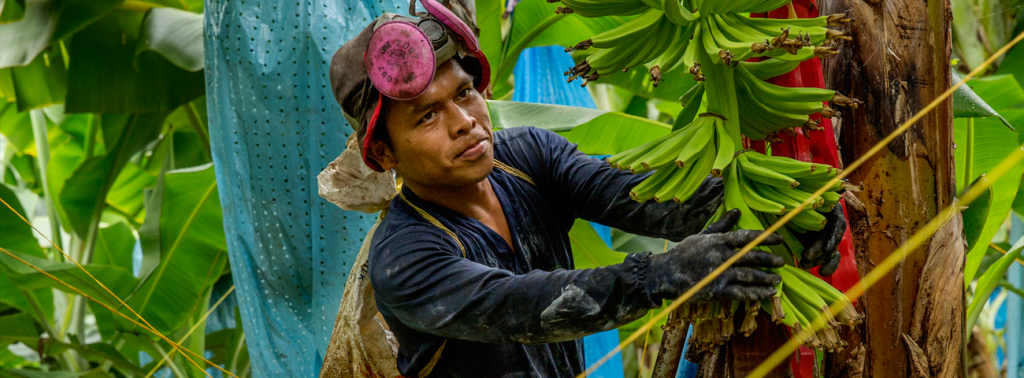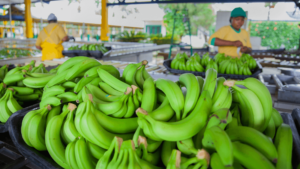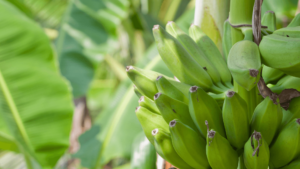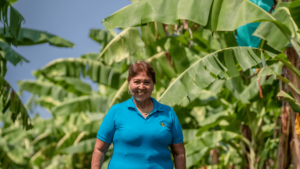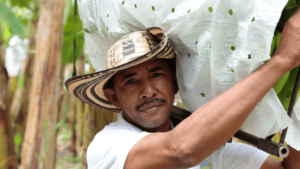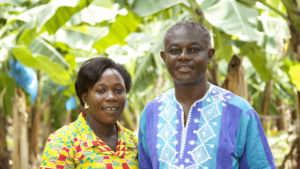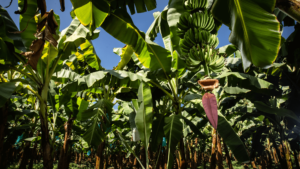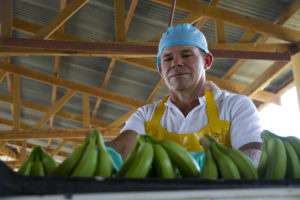Bananas are the favourite fruit in our grocery basket and are grown by millions of people, working on small-scale farms in tropical regions.
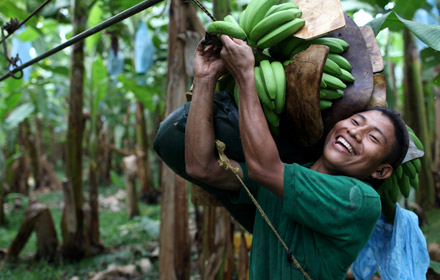 Bananas are the staple food for millions of people around the world and the UK’s most popular fruit.
Bananas are the staple food for millions of people around the world and the UK’s most popular fruit.
Bananas are grown both on small family farms and much larger commercial farms. The banana industry provides employment for thousands of people in Latin America, the Caribbean, Southeast Asia, and West Africa. It generates vital foreign exchange earnings that governments depend on to improve health, education, infrastructure and other social services.
The Windward Islands, for example, traditionally earn around a fifth of their total export earnings from bananas alone. For Ecuador and Costa Rica, the figures are around 9 and 8 per cent respectively. In addition, the industry employs thousands of people in distribution networks and supermarkets worldwide.
The trade in bananas is a cornerstone of many countries’ economies, but the social problems in the industry are many and complex. Reports about problems in the banana industry often highlight the incredibly challenging situation for workers: low wages, precarious employment, restrictions on the right to organise into groups and the handling of unhealthy and environmentally hazardous chemicals without adequate protection, to name a few.
For smallholder farmers dependent on growing bananas for a living, challenges abound too – with rising costs of production but stagnation in prices, and the severe impacts of changing climate and weather patterns making production unpredictable and unsustainable.
Why is Fairtrade important?
Fairtrade works with banana farmers, workers employed on plantations and with the banana trade to create more value for producers and ensure people get a decent price and decent pay for the hard labour that goes into growing this crop.
Bananas carrying the FAIRTRADE Mark have been produced by small farmer organisations or plantations that meet the Fairtrade social, economic and environmental standards. The standards include protection of workers’ rights and the environment and payment of the Fairtrade Minimum Price and an additional Fairtrade Premium to invest in business or community projects. Read more about the Fairtrade Standards.
Our report Fairer Fruit looks at the impact that the Fairtrade system makes, and what more can be done to deepen that impact. Open the Fairer Fruit report.
Read more about what goes into growing a banana and the difference Fairtrade can make.
Meet the Fairtrade banana farmers
This film tells the story of some of the people who produce bananas and their journey to getting a fairer deal.
Where to buy Fairtrade bananas
One in three bananas bought in the UK is Fairtrade. Co-op, Sainsbury’s, Waitrose, Ocado and Booths sell only Fairtrade bananas.
Find out where you can buy Fairtrade bananas.
Top 12 Facts about Fairtrade Bananas
Fairtrade banana farmers
Alexis Palacios, Agrosiete, Colombia
Alexis Martinez Palacios is a full-time worker in the packing facility of Agrosiete, a banana plantation located in Urabá, Colombia.
BANAFRUCOOP, Colombia
Cooperativa de Productores de Banano del Magdalena (BANAFRUCOOP) is a smallholder banana producers co-operative located in northern Colombia
Yadira Orozco, ASOBANARCOOP, Colombia
Yadira Orozco works at banana farming co-operative ASOBANARCOOP, where the Fairtrade Premium is being invested in new infrastructure and women’s empowerment.
Foncho Cantillo, Coobafrio, Colombia
Albeiro Alfonso Cantillo, known as Foncho, is a banana farmer from Cienaga, in the banana growing region of Magdalena, northern Colombia.
Juliet Arku-Mensah, VREL, Ghana
Juliet’s role as Fairtrade Officer includes supporting VREL in complying with Fairtrade Standards and maintaining its Fairtrade Certification.
Plantación Martha María, Colombia
Plantación Martha María is a medium-size producer of banana for the export market, located in the Uraba region of northwest Colombia.
Ramón Vargas, Las Mercedes, Dominican Republic
Ramón Vargas is a banana farmer at a banana co-operative that is investing in improving production processes for farms in the co-operative.
